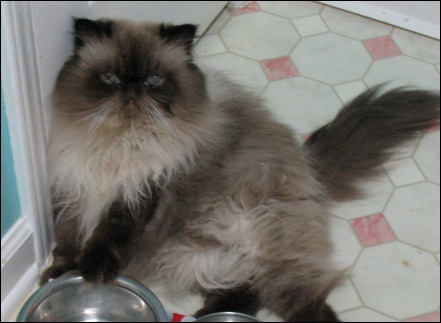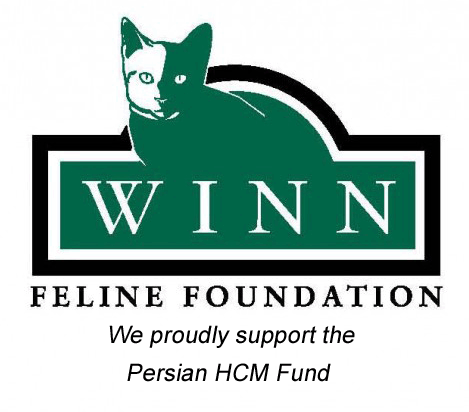

Project: Ronan's Big Heart
By Jeanne O'Donnell (Donegal Cattery)
When I accepted the challenge in 1996 to breed for a show
quality lilac point Himalayan, little did I know the road blocks
I would come across in my quest. Oh, I was educated about FIP
(Feline Intestinal Peritonitis) and warned about Ringworm. If
you breed long enough, bring in new breeding cats, or simply
attend a cat show, you will eventually meet the task of addressing
these issues in your cattery. But it all seemed worthwhile to
achieve a goal that few had attempted, and even fewer attained.
It was common knowledge that cats that lived to a mature
adult age would die from either kidney failure or cancer. We,
as breeders, in our quest for producing healthy Persians, backed
the research to find the genetic marker for the most common
form of kidney disease, PKD (Polycystic Kidney Disease). We
can now genetically test our breeding cats for this disease
and eliminate it from occurring in offspring, so that's one
less heartache.
I have been breeding now for seventeen years, and throughout
those years I never heard a Persian cat breeder speak of heart
disease. So I assumed that it was an uncommon disease for cats.
Well, you know what they say about assuming. It wasn't that
heart disease didn't exist in Persian cats. It was that no one
was revealing its existence. It could have been ignorance, but
not for the experienced breeder. No, it was the Ostrich Syndrome.
There was no way to predict which cat would inherit the
gene for HCM (Hypertrophic Cardiomyopathy). So no one talked
about it. After all, HCM had the full attention of Maine Coon
and Ragdoll breeders. It was "their" disease.
So how prevalent is HCM in Persians? There are various estimates
of the current penetration of the disease in this breed. My
veterinarian, who has dealt with many breeders over her thirty
plus years of practice, says she is seeing HCM by cardiac ultrasound
at a rate of about 40% in Persians cats. FORTY PER CENT of Persians,
at least within the realm of her practice, are carrying the
potential for having this disease; and they have a 50% rate
of passing it as a breeding cat, even if they inherited the
gene from only one parent. That sounds very similar to the characteristics
of PKD, doesn't it?
So do we continue to ignore it and hope it will go away,
or do we do something about it, like we did with PKD? In my
opinion, there is only one answer to this question. The work
has already begun. Four years ago I was referred by the CFA
(Cat Fanciers' Association) to a researcher who was looking
for this genetic marker in Persian cats. I began submitting
DNA & pedigrees on all of my cats and kittens and asked
many of my former clients to contribute as well. I put together
test kits and sent them to my clients.
Researchers had discovered the genetic marker for HCM in
Main Coons, so my hope was high. I even submitted an article
to the Atlantic Himalayan Club, which they published in Cat
Tracks, hoping that at least the Himalayan breeders would get
involved. But I received no response.
The researcher was excited with my willingness to participate.
And at roughly three years into our coalition, I finally had
a diseased heart tissue to submit, a key to help in unlocking
the genetic code. Ronan, my loving seal point Himalayan, who
made it to thirteen years of age with his big heart, finally
succumbed to multi-organ failure and donated his heart to this
study. Sadly, it was at that point that I learned the study
had stalled. There wasn't sufficient help or funds to actively
pursue it. What is even more disheartening is that the researcher
is the one who now does the genetic testing for the CFA, and
even the CFA is powerless to help.
My only hope was pleading with the Winn Feline Foundation
after seeing grant after grant awarded for more PKD research,
or even worse, HCM grants for other much smaller breeds. How
could this happen? The Persian breed is the most popular of
all purebred cats, so that means a greater number of "heart
sick" cats being bred. And that grieves my heart deeply.
It's hard to imagine holding a two and a half year old female
cat in your arms gasping for air until she dies from congestive
heart failure. That was how I lost my beautiful tortie point,
Foxy, the Himalayan who loved to shake the branches of my wintered-over
hibiscus just to watch the leaves fall.
So here is my new challenge: TO CHALLENGE YOU. It is long
overdue for Persian breeders to pull their heads out of the
sand and step up to the plate, the contribution plate that is.
Client contributions will be greatly appreciated as well. I
have made arrangements with Maureen Walsh of the Winn Feline
Foundation to set aside an account within a fund that is designated
strictly for HCM research. It is called the Ricky Fund.
I am asking, NO I AM PLEADING with all Persian breeders
and our clients to make an anonymous contribution to this fund.
You will need to state that it is for the Persian HCM research
on the donation form, hand written under the Ricky Fund option.
The researcher, Dr. Gus Cothran, will submit a grant proposal
to re-initiate this study. But he will only receive a grant
if there is sufficient funding allocated in the Ricky Fund to
do the work.
The Norwegian Forest Cat breeders recently banded together
for their breed's HCM research and raised $23,577 allocated
as a Winn Feline Foundation grant. With the large Persian base
that we have in breeders and clients, we can easily exceed that.
If you want to continue to breed and/or own Persian cats, it
is your obligation to get involved.
So make the donation. And if you want to begin submitting
DNA for this study, please call me and I will give you Dr. Cothran's
contact information. But we first need to raise adequate funding.
This will likely be the most important endeavor you can make
to the future of the Persian breed. It is far more important
than producing that "perfect cat." So Persian breeders
& pet buyers: it's time to do something really great for
the breed.
If you wish to talk with me about this disease, I can be
reached at 910-270-4787. I can call anywhere in the USA and
Canada for free, so just leave me your name and phone number
and the best time to call on my answering machine. Thanks for
your support.
Jeanne O'Donnell (Donegal Cattery)
Cardiomyopathy is a term that means disease
of the heart muscle. The most common heart disease found in
all types of cats is hypertrophic cardiomyopathy (HCM). Many
cats live normal lives with HCM, but others will suffer devastating
consequences, even death. Support research on this important
disease by donating to the Ricky Fund allocated through the
Winn Feline Foundation.
You can help the future of the beautiful Persian Breed.
All donations
can be made directly to Persian HCM Research Fund.
 Click
Here to Donate (Persian HCM Fund) Click
Here to Donate (Persian HCM Fund)
1) Click the "Stipulated Funds" tab
2) Scroll down to "Persian HCM Research Fund" and
click "Give Now"
3) Click the dropbox and choose option, "I would like
to choose a specific purpose for this donation."
4) Specific Purpose: "Persian HCM Fund", and donation
amount

All Photos Protected by Copyright Laws
|

